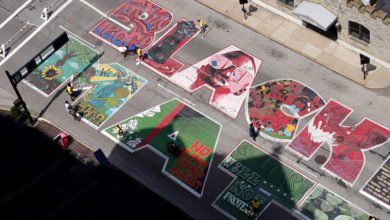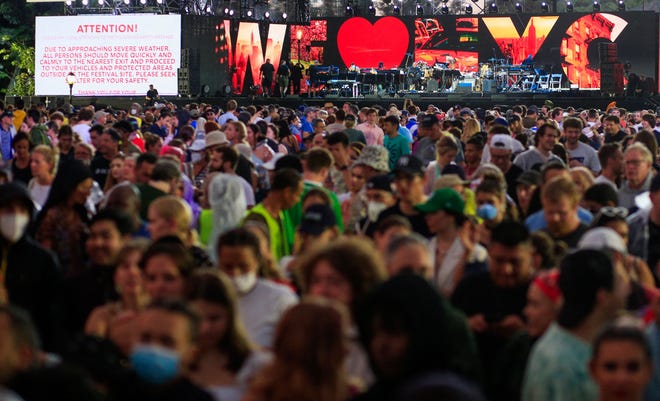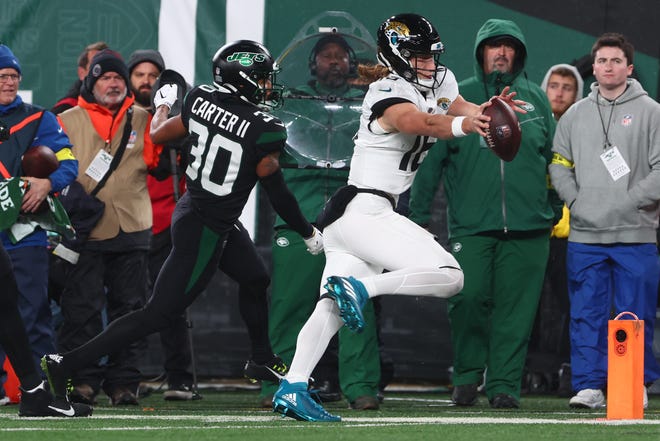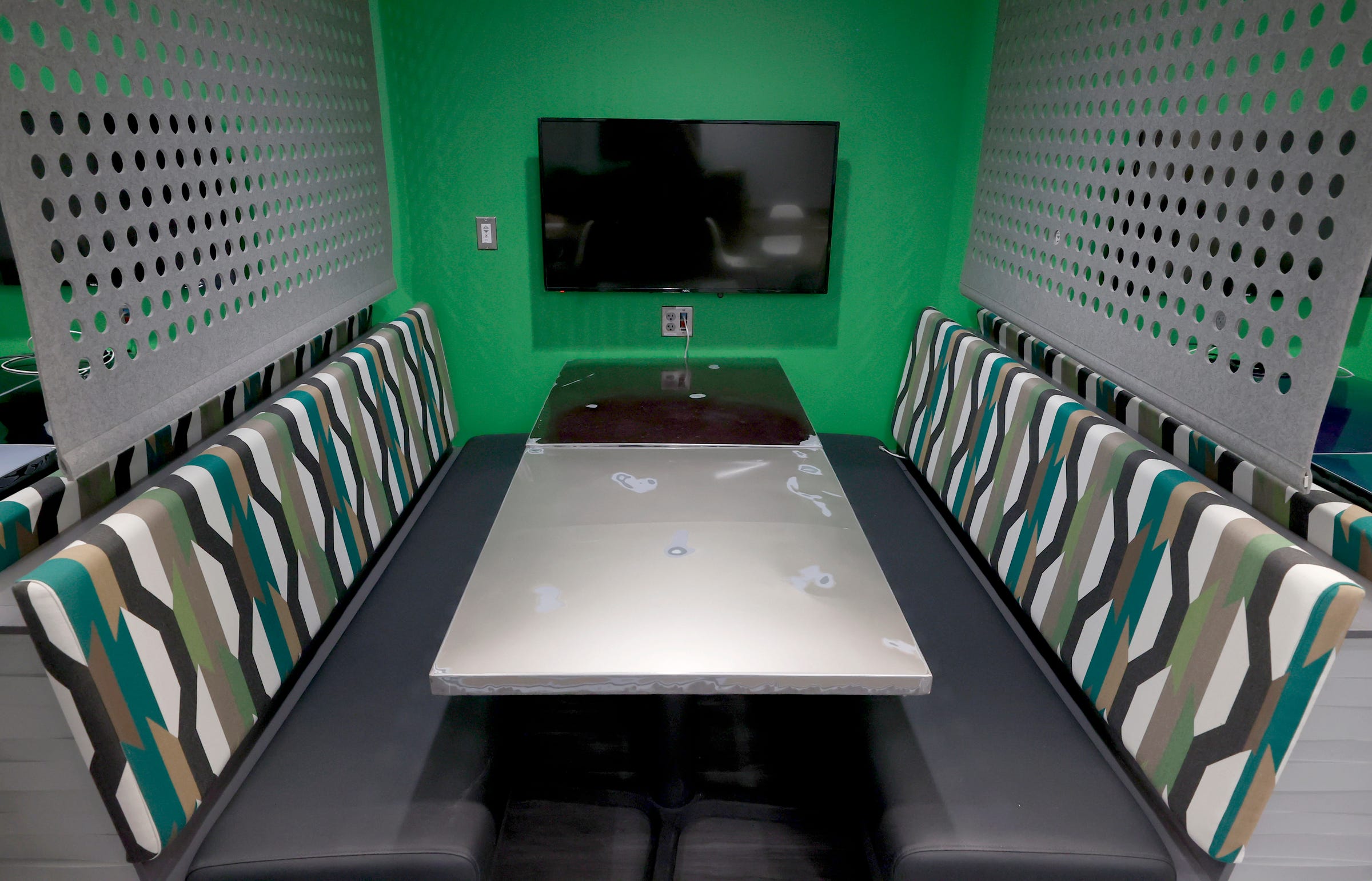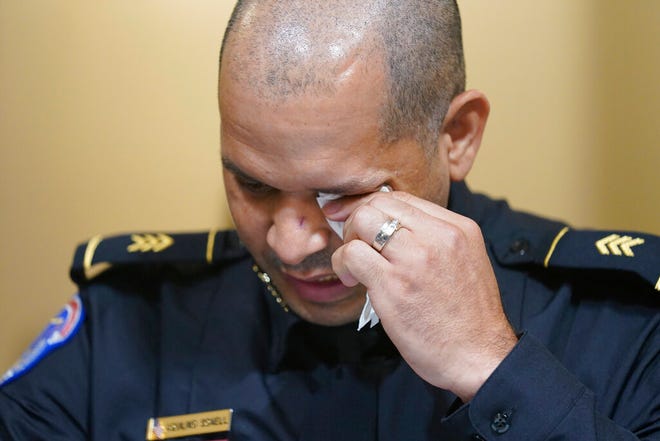
WASHINGTON – Beaten unconscious. Blasted with chemical irritants. Attacked with a flagpole. Called a racial slur.
Four law enforcement officers offered gripping accounts Tuesday of the harrowing violence and terrible fear they endured while trying to defend the U.S. Capitol on Jan. 6, when a mob of then-President Donald Trump's supporters stormed the building.
The officers' accounts provided a dramatic opening for the House select committee investigating the Jan. 6 Capitol attack, in which Trump's supporters tried to stop the certification of Joe Biden's 2020 election win.
Here are highlights from their testimony.
Capitol Police Sgt. Aquilino Gonell
An Army veteran, Gonell said his experience during the insurrection was more terrifying than serving in Iraq, where he had to conduct supply missions on roads laced with improvised explosive devices.
"Nothing in my experience in the Army or as a law enforcement officer prepared me for what we confronted on Jan. 6," he told the panel, recounting hand-to-hand combat with the rioters that likened to a "medieval" battle.
"I did not recognize my fellow citizens," Gonell said. One rioter, he said, "shouted that I —an Army veteran and a police officer — should be executed."
As he and his fellow officers were punched, kicked and sprayed with chemicals, "I could feel myself losing oxygen and recall thinking to myself, 'This is how I'm going to die'," Gonell said.
Six months after the riot, Gonell said he is still recovering from injuries.

DC Metro officer Michael Fanone
Fanone, who nearly died on Jan. 6, has emerged as one of the most outspoken enforcement officials in the wake of the Capitol riot, during which he was beaten unconscious and suffered a heart attack.
In the months since Jan. 6, he has lobbied Congress to create a bipartisan, independent commission to probe the riot and lashed Republicans for downplaying the attack.
At Tuesday's hearing, he moved into the spotlight once again.
“As I was swarmed by a violent mob, they ripped off my badge, they grabbed and stripped me of my radio, they seized a munition that was secured to my body,” Fanone recalled. “They began to beat me with their fists and what felt like hard metal objects.”
At one point during the riot, Fanone was pulled from a line of police by a rioter who shouted “I got one!”
As he was beaten, he heard a rioter shout to “Get his gun! Kill him with his own weapon.”
" ... I was electrocuted again and again and again with a taser. I’m sure I was screaming but I don’t think I could even hear my own voice,” he recounted.
"I have kids," he responded in a plea for his life.
“I still hear those words in my head today,” Fanone told lawmakers.
An unconscious Fanone was later driven by another injured officer to a nearby hospital, where he was told he suffered a heart attack and multiple life-threatening injuries. He now suffers from post-traumatic stress disorder.
“I thought I had seen it all, many times over,” Fanone said. “Yet what I witnessed and experience on Jan. 6, 2021, was unlike anything I had ever seen, anything I had ever experienced or could have imagined in my country.”

Who's who: Meet the members of the House's January 6 select committee
U.S. Capitol Police officer Harry Dunn
U.S. Capitol Police Officer Harry Dunn recounted how pro-Trump protestors continued to swell at the side of the Capitol all morning on Jan. 6 before becoming violent after thousands had assembled.
Rioters chanted “Stop the steal!,” clinging to the false claim that Trump was still the true elected leader of the country. When Dunn said that he’d voted for Biden and inquired if his vote didn’t matter, the already hostile crowd became irate.
“One woman in a pink 'MAGA' shirt yelled, “You hear that, guys, this (N-word) voted for Joe Biden!” he remembered.
"No one had ever called me a (N-word) while wearing my Capitol Police uniform,” Dunn testified.
Dunn also recounted how the aftermath of the day had been a “blur” to him. At one point he broke down in despair in the Capitol rotunda and asked how the attack was even possible, he said.
In the months since the attack, Dunn has said he’s been in support groups for his mental health to deal with the trauma of the attack, declaring that “there’s absolutely nothing wrong” with seeking help. Two Capitol police officers have died by suicide in the months since the attack.
Dunn also directly addressed the rioters and insurrectionists who were at the Capitol that day, saying “democracy went on that night and still continues to this day… you all tried to disrupt democracy, and you all failed.”

DC Metro Police officer Daniel Hodges
Hodges said rioters bashed his head, kicked him in the chest, and sprayed him with a chemical irritant during the riot, among other assaults.
One attacker told him he would “die on your knees.”
During one scuffle, a rioter tried to take Hodges' baton and another kicked him in the chest and moved his mask over his eyes, leaving him temporarily blind while under attack.
While at his post as rioters began to assemble, he saw people in the crowd in tactical gear, wearing ballistic vests, helmets and goggles, appearing “to be prepared for much more than listening to politicians speak at a park,” he recalled.
“Terrorists were breaking apart the middle fencing and bike racks and the individual pieces, presumably to use weapons,” Hodge told the committee.

In the haze, Hodges said he remembers seeing the "thin blue line flag, a symbol of support for law enforcement" being carried by the rioters who then attacked the very officers they claimed to support. Hodges was told he was “on the wrong team” by one of the attackers.
As he was being gassed and having his head smashed, Hodges recounted screaming for help until fellow officers were able to save him from the attackers.
Contributing: Deirdre Shesgreen, Matthew Brown
Source link



